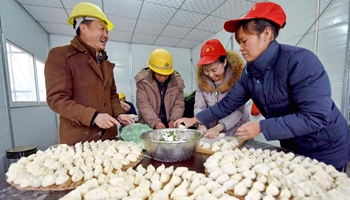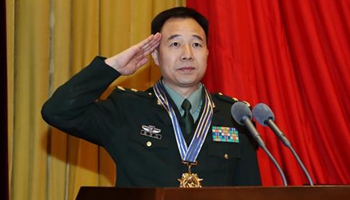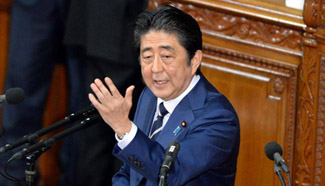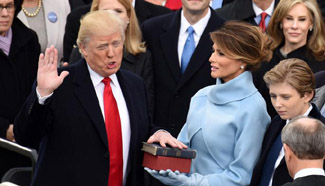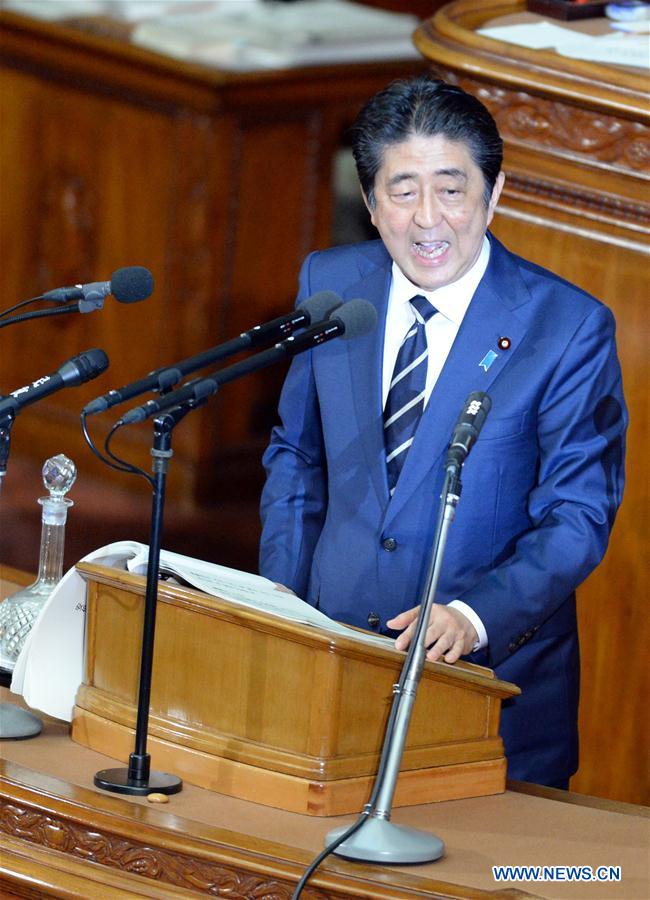
Japan's Prime Minister Shinzo Abe delivers a policy speech at the ordinary session of the National Diet in Tokyo, Japan, on Jan. 20, 2017. (Xinhua/Ma Ping)
TOKYO, Jan. 20 (Xinhua) -- Japanese Prime Minister Shinzo Abe delivered a policy speech on Friday at the opening of a 150-day ordinary session of the National Diet, in which he stressed the importance of U.S.-Japan alliance while calling for changing the pacifist Constitution.
Speaking in parliament just hours before the inauguration of the next U.S. President Donald Trump, Abe said that the position of the Japan-U.S. alliance as the linchpin of Japanese foreign policy and security is an "unchanging principle."
He also said that he wants to hold talks with Trump as soon as possible after the inauguration.
Japan has been eager to repair relations with Trump, as the nation has largely bet its support on Hillary Clinton in the U.S. Presidential election and Trump's win has caught it off guard.
Japan has also hoped to change Trump's opinion on the Trans-Pacific Partnership (TPP) trade agreement, as the President-elect has made it clear that he would draw the U.S. out of the TPP as soon as he takes office.
Japan on Friday notified New Zealand, secretariat for the TPP, that it had completed the domestic procedures for the pact, as the first country among the 12 signatory nations to do so.
To make the TPP pact come into effect, at least six original signatories have to have successfully ratified the agreement and those six signatories, between them, must represent 85 percent of the total GDP of the 12 original signatories.
As the U.S. represents nearly 62 percent of the TPP GDP and Japan accounts for some 17 percent, it means that both Japan and the U.S. have to ratify the pact for the TPP to come into effect.
With the TPP's outlook bleak, Abe said on Friday that Japan will take a leadership role in negotiations toward the Regional Comprehensive Economic Partnership (RCEP) free trade mega-pact.
In his policy speech, Abe also called on the Diet members to deepen discussions on constitutional amendment, claiming that this year is a suitable time for changing Japan's pacifist Constitution which came into force 70 years ago.
Altering the pacifist Constitution has been one of Abe's long-standing goals. With gains in the upper house election in July 2016, Abe's ruling bloc and like-minded forces in favor of changing the Constitution now take up two-thirds of both chambers of the parliament, a prerequisite for proposing constitutional amendments.
Abe also addressed the sensitive issue in his speech regarding Japanese emperor's abdication, saying that efforts to formulate legislation would require the understanding of the public.
Japanese emperor Akihito indicated his wish to abdicate in a video message in August last year. According to local media, if the emperor is to abdicate, the Imperial House Law might need revision, as the law, enacted in 1947 to rule for imperial affairs, does not include any provision for a reigning emperor to abdicate.
The Diet members will discuss the contents of Abe's policy speech as well as the speeches made by some other cabinet ministers in the question-and-answer sessions next week.




